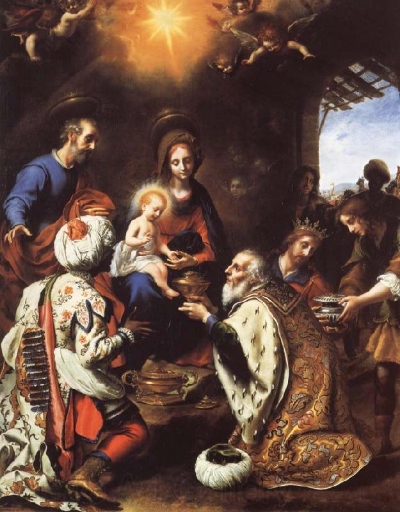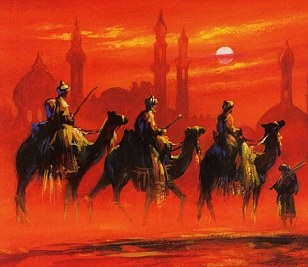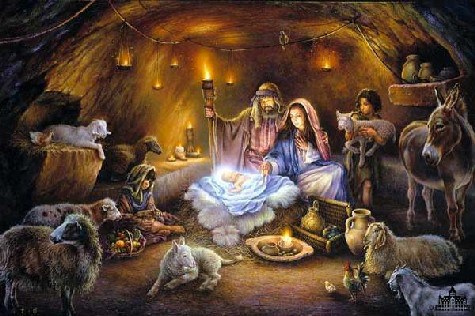Merry Christmas – Savor, Unwrap and Present this gift
By Janae Bower
"The Joy of the Gospel" is an incredible gift with a beautiful bow tied together with insightful commentary from all the Catholic evangelists, writers and speakers who contributed to this blog. Whether you read one paragraph of the Apostolic Exhortation or all 48,000 words of it, you have received a precious present. We hold in our head, heart and hands how to live and love like Jesus.
We celebrate Jesus being born today in Bethlehem which in Latin translates into house of bread. Every Mass we celebrate in our church home receiving Jesus as our daily bread. Just as the Eucharist is the source and summit of our faith, we’ve all just reached the summit of this experience regarding the true source of our life and love.
So what should we do with this gift? Let’s savor it, next unwrap it and then present it.
Savor it – Advent Preparation
Being part of this intentional daily Advent experience flipped things for me this Christmas season. When in the past I’ve struggled with fitting my Advent duties into my Christmas activities; this year I struggled with fitting in my Christmas duties with my Advent activities. My Advent preparations far out-weighed my Christmas preparation and I even have documentation to prove it (the pages and pages of notes I took from the Evangelii Gaudium compared to my few Christmas lists).
Just as Kelly set this process into digestible sips for us, I hope you savored each one and let the flavor penetrate deep within your soul. Now that it’s done, I encourage you to keep relishing these hope-filled messages. What usually happens after we experience things like this is that we check it off our list and move to the next thing. Yet when we ponder in our hearts like Mary did the Lord can really brew it into something special.
Hold this gift in your hands. Feel the joy it’s brought to your heart. Savor it with all your senses.
Unwrap it – Christmas Examination
Picture three young boys in front of a Christmas tree with a pile of gifts and no gift-opening rules. It’s complete chaos; a whirlwind of wrapping paper and presents flying everywhere (FYI: I learned quickly the importance of rules even when opening gifts).
This is what the Christmas season often feels like to me – a whirlwind of activity that I’m just trying to rip through. Yet when I approach it this way, I don’t take the time to really unwrap the true experience of the season and appreciate all the gifts.
Let’s use these twelve days of Christmas to unwrap what this Apostolic Exhortation experience means to us. We can use these 12 days to slowly reveal the gifts of enlightenment, encouragement and evangelization we’ve received. The Holy Father opened up (in paragraph 3) by inviting us to a renewed personal encounter with Jesus and what a perfect time to do so at Jesus’ birth. “The Lord does not disappoint those who take this risk; whenever we take a step toward Jesus, we come to realize that he is already there, waiting for us with open arms.”
How did you grow intellectually with your faith? What touched your heart and soul like never before? How are you inspired to be the hands and feet of Jesus after this?
Adapting a couple of practices within our faith could be helpful in examining this experience deeper. One way is through Lectio Divina. You could use this sacred process of reading the scripture, one in which the Holy Father encourages us to do as well (paragraph 153), to unwrap what is meaningful to you. Read through your notes and the reflections; meditate on what is speaking to you; pray for how God wants to use you; and then contemplate what this means for your life.
Another way to examine this experience is adapting St. Ignatius’ Examen, one of the most important of his Spiritual Exercises that help to engage in the practice of examining one’s soul and life. Matthew Kelly adapted this into a Prayer Process that will be a “game changer for you spiritually and a game changer for every aspect of your life.” We can use his process to do the same with the Apostolic Exhortation:
· Gratitude – What are you most thankful for with this experience?
· Awareness – How did you gain a deeper awareness in your life?
· Significant moments – What was most significant for you and explore what God might be trying to say to you?
· Peace – Ask God to forgive you for any wrongs and to fill you with peace. How might you spread peace to others?
· Freedom – How is he inviting you to change your life so you can experience the freedom to be the best, holy you?
· Others – How is God inviting you to evangelize and share the Good News to others?
Present it - Epiphany Jubilation
The Feast of the Epiphany our Lord Jesus Christ is one of the oldest Christian feasts. It marks the end of the twelve days of Christmas. Epiphany comes from a Greek word meaning “to reveal.”
What did the Lord reveal to you in this Apostolic Exhortation?
Exhortations are meant to thoroughly encourage us, urge us to embark on a new chapter in our faith life NOW. This can be your chance to present to the King, as the three wise men once did, your gift to him. Like the wise men, you’ve grown in wisdom through this journey and have divine gifts to share with him and to the world.
We need to know in our hearts what really matters to us; what is God – through this holy document and holy writers – trying to help us learn and discern right now in our own lives. This is our chance to write our own “Apostolic Exhortation” from how the Holy Spirit spoke to us from this inspired experience.
Write your own joy-filled exhortation, one that will personally lift and guide you as a missionary disciple for 2014 and beyond. Once we know how we can uniquely express that heart of what matters to Jesus, then our hearts can be aflame with his love for the world!
To do so, use you what you learned from the examination suggested above and then create our own CLIFF notes.
C – Clearly
L – Logically
I – Identifying
F – Faith-filled
F – Favorites
Instead of this year making another resolution around something you want to do better; this year I encourage you to mix things up and make a reSOULtion of how you will be more like Jesus this year. We encourage you to come back to us on the Feast of the Epiphany and after to present to us the big ahas from your own joyous exhortation. It will be a merry Christ-filled gift that you’ll be able savor, unwrap and present to others!


























